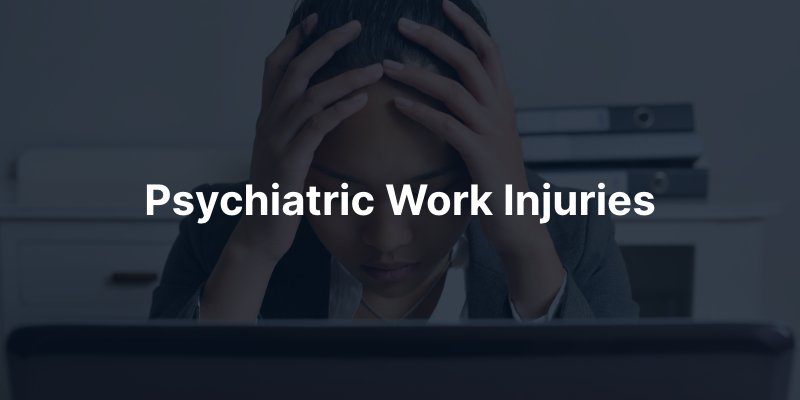Psychiatric work injuries are a critical but often overlooked aspect of workplace safety. While physical injuries are more immediately apparent, the impact of psychiatric injuries can be just as severe, if not more so.

Psychiatric work injuries encompass a range of mental health conditions that arise due to the workplace environment. These include anxiety disorders, depression, post-traumatic stress disorder (PTSD), and other psychological conditions. These injuries are not always sudden and can develop over time due to chronic workplace stress or traumatic incidents.
In California, workers who suffer psychiatric injuries as a result of their jobs are entitled to workers’ compensation benefits.
These benefits cover related medical expenses, including therapy, counseling, and medication.
Additionally, workers’ comp provides temporary disability benefits to pay for partial wages for the time an employee is unable to work due to the psychiatric injury.
If a psychiatric injury results in a permanent impairment, a qualified medical evaluator (QME) may assign a disability rating. This rating is a percentage that indicates the level of permanent impairment. Permanent disability benefits are provided based on this rating, and they are meant to compensate the worker for the lasting effects of the psychiatric injury.
If a psychiatric injury prevents a worker from returning to their previous job, California’s workers’ compensation system provides options for retraining or vocational rehabilitation.
This may include financial assistance for job training, education, or skill development to help the injured worker transition into a new role.
In certain situations, a third party (not the employer) may be responsible for the psychiatric injury. For instance, if the worker was injured or witnessed an accident caused by a defective product, a separate legal claim against the responsible party, such as the manufacturer, may be pursued for compensation in addition to workers’ comp.
An employee must seek out psychiatric help and receive a diagnosis to qualify for benefits as well as meet the following qualifications:
Keeping records of incidents, seeking medical attention, and reporting the issue to supervisors are crucial steps in building a case. Additionally, any communication, such as emails or messages, that can support the claim should be preserved.
Take the following steps to pursue workers’ compensation benefits for a psychiatric work injury:
Speak to an Orange County workers’ compensation attorney can be invaluable. They will help gather the required evidence, ensure that all necessary steps are taken to file a successful claim and that you recover the compensation you deserve.